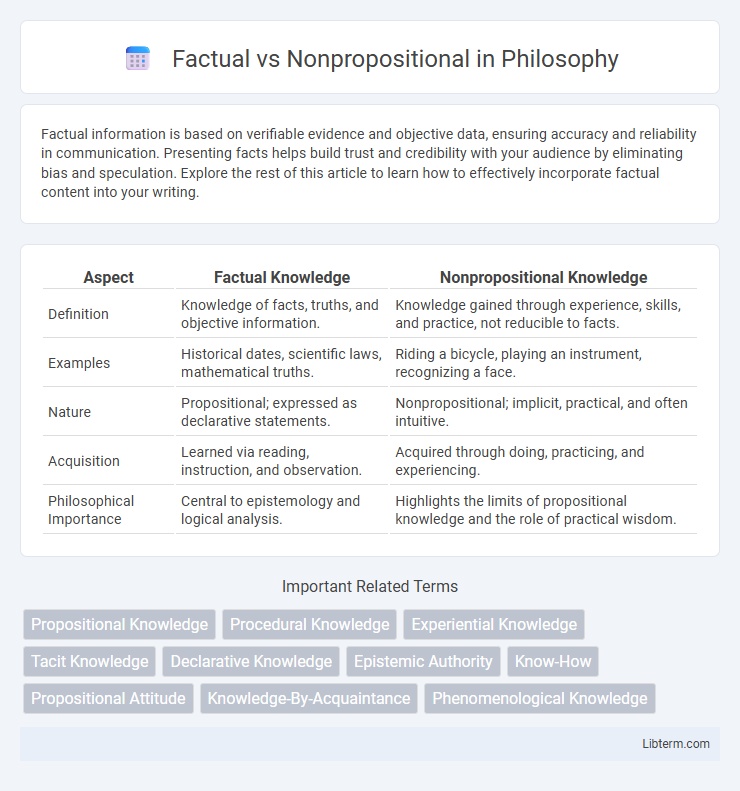Factual information is based on verifiable evidence and objective data, ensuring accuracy and reliability in communication. Presenting facts helps build trust and credibility with your audience by eliminating bias and speculation. Explore the rest of this article to learn how to effectively incorporate factual content into your writing.
Table of Comparison
| Aspect | Factual Knowledge | Nonpropositional Knowledge |
|---|---|---|
| Definition | Knowledge of facts, truths, and objective information. | Knowledge gained through experience, skills, and practice, not reducible to facts. |
| Examples | Historical dates, scientific laws, mathematical truths. | Riding a bicycle, playing an instrument, recognizing a face. |
| Nature | Propositional; expressed as declarative statements. | Nonpropositional; implicit, practical, and often intuitive. |
| Acquisition | Learned via reading, instruction, and observation. | Acquired through doing, practicing, and experiencing. |
| Philosophical Importance | Central to epistemology and logical analysis. | Highlights the limits of propositional knowledge and the role of practical wisdom. |
Introduction to Factual and Nonpropositional Knowledge
Factual knowledge refers to information that is objective, verifiable, and can be expressed in clear propositions or statements, such as "Paris is the capital of France." Nonpropositional knowledge includes skills, experiences, and know-how that cannot be easily articulated in words, like riding a bicycle or recognizing a face. Understanding the difference between these knowledge types is crucial for fields like epistemology, cognitive science, and education, where both explicit facts and implicit competencies are valued.
Defining Factual (Propositional) Knowledge
Factual knowledge, also known as propositional knowledge, involves understanding specific information that can be expressed in declarative statements and verified as true or false. It encompasses facts, concepts, and data that are systematically organized and can be articulated clearly, such as historical dates, scientific principles, or mathematical formulas. This type of knowledge contrasts with nonpropositional knowledge, which includes skills and know-how that are practical and often implicit, rather than explicitly stated.
Understanding Nonpropositional Knowledge
Nonpropositional knowledge refers to understanding gained through experience, intuition, or skills rather than explicit factual statements. This type of knowledge is embodied in practical abilities like riding a bike or recognizing emotions, which cannot be easily articulated as true or false propositions. Grasping nonpropositional knowledge involves tacit awareness and contextual insight that complement propositional facts for comprehensive cognitive competence.
Key Differences Between Factual and Nonpropositional Knowledge
Factual knowledge consists of objective, verifiable information such as dates, statistics, and concrete details, allowing for clear truth assessment and explicit communication. Nonpropositional knowledge involves subjective experiences, skills, and intuitions, such as knowing how to ride a bike or recognizing emotions, which cannot be fully articulated in declarative sentences. The key difference lies in factual knowledge being propositional and easily transmitted, whereas nonpropositional knowledge is often tacit, experiential, and difficult to express verbally.
Examples of Factual Knowledge in Everyday Life
Factual knowledge includes verifiable information such as historical dates, scientific facts, and geographical locations, like knowing that Paris is the capital of France or that water boils at 100degC. Common examples in everyday life involve recalling phone numbers, remembering names of colleagues, or understanding basic math operations like 2+2=4. This type of knowledge contrasts with nonpropositional knowledge, which encompasses skills and experiences, such as riding a bike or playing a musical instrument.
Examples of Nonpropositional Knowledge in Practice
Nonpropositional knowledge includes skills and know-how that cannot be fully expressed through declarative statements, such as riding a bicycle, playing a musical instrument, or recognizing a face. This type of knowledge is often demonstrated through performance or action rather than verbal explanation, highlighting its practical, embodied nature. Examples include the intuitive judgment of a chess player during a game and the tacit understanding a craftsman employs when shaping wood.
The Role of Experience in Nonpropositional Knowledge
Nonpropositional knowledge, often termed experiential knowledge, arises directly from firsthand experience rather than factual or propositional statements. This type of knowledge encompasses skills, sensations, and emotions that cannot be fully articulated through language but are deeply embedded in personal experience and practice. The role of experience is critical, as it shapes understanding through immersion and active engagement, making nonpropositional knowledge inherently subjective and context-dependent.
Importance of Factual Knowledge in Learning
Factual knowledge serves as the foundation for advanced cognitive processes, enabling learners to efficiently acquire new skills and solve complex problems. Nonpropositional knowledge, such as skills and experiences, relies heavily on accurate and well-organized factual information for effective application. Empirical studies demonstrate that a strong factual knowledge base enhances comprehension, retention, and the ability to transfer learning across domains.
How Nonpropositional Knowledge Shapes Skills and Abilities
Nonpropositional knowledge, often termed tacit or implicit knowledge, profoundly influences the development of skills and abilities by enabling intuitive understanding and automatic execution without conscious reasoning. This form of knowledge is embodied in activities like riding a bicycle or playing a musical instrument, where muscle memory and sensory experiences guide performance. Unlike factual knowledge, nonpropositional knowledge shapes expertise through practice and experience, fostering seamless skill acquisition and adaptability in complex tasks.
Integrating Factual and Nonpropositional Knowledge for Personal Growth
Integrating factual knowledge, grounded in verifiable data and objective truths, with nonpropositional knowledge, which encompasses skills, experiences, and tacit understanding, fosters comprehensive personal growth by balancing cognitive and experiential learning. This synergy enhances decision-making, problem-solving abilities, and emotional intelligence by combining explicit information processing with intuitive judgment. Cultivating both types of knowledge accelerates adaptive learning and self-awareness, essential for holistic development and lifelong success.
Factual Infographic

 libterm.com
libterm.com